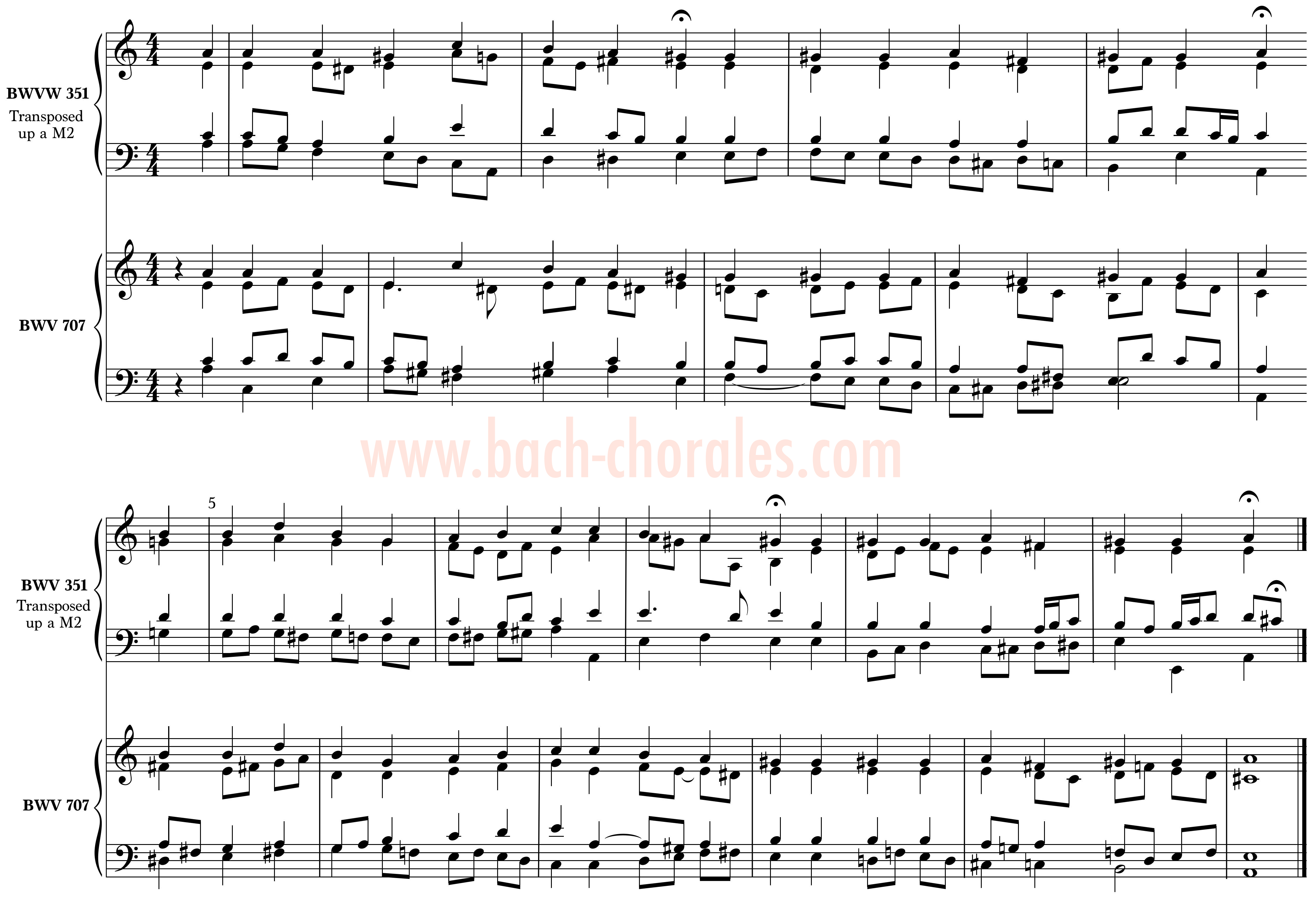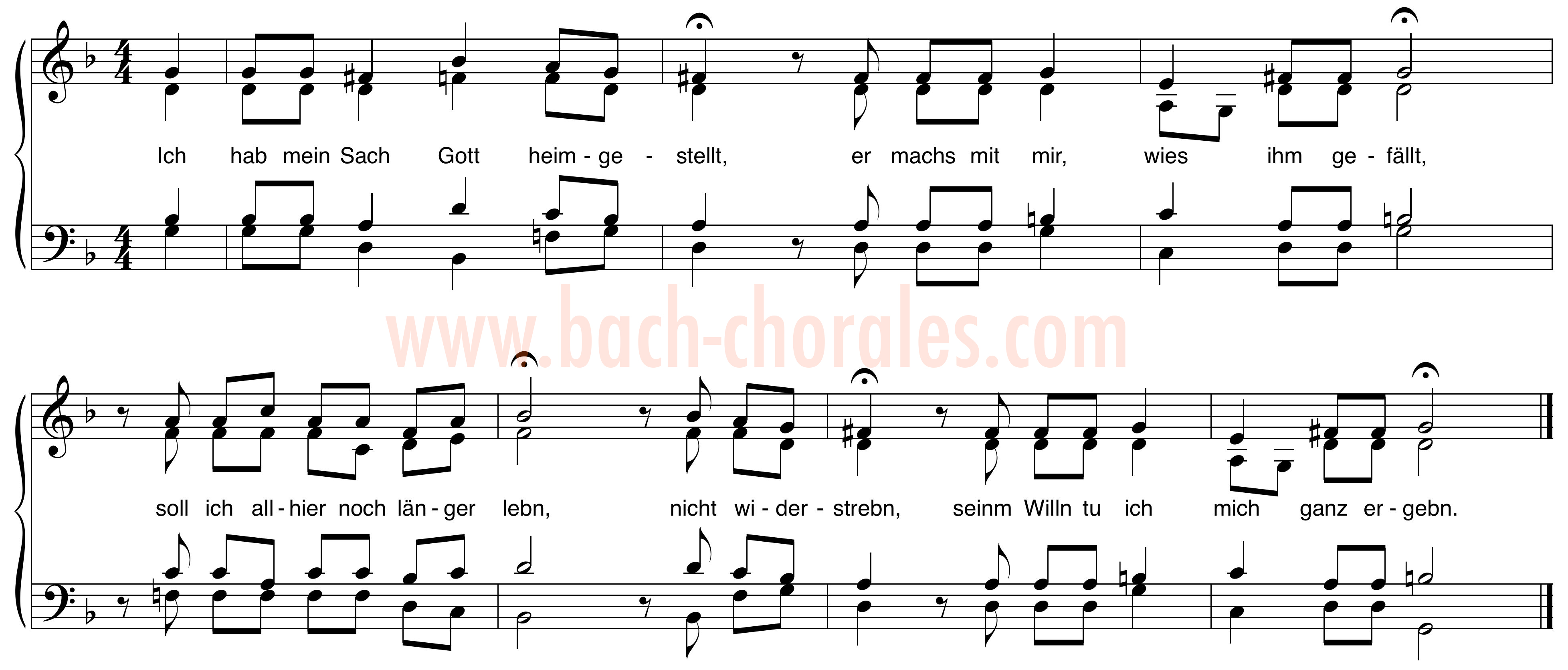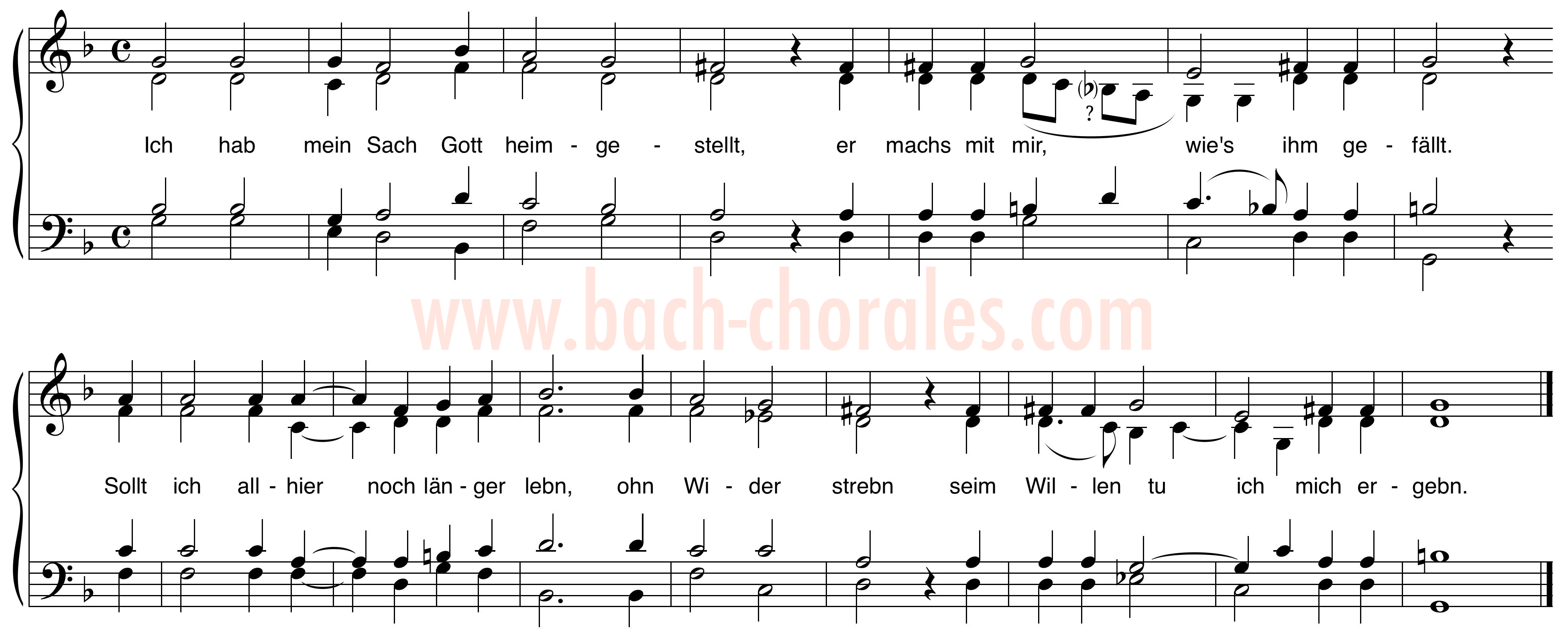Chorale Background: Ich habe mein Sach Gott heimgestellt
Contributed by Thomas Braatz
Text & Translation
Author: Johann Leon c. 1530–1597
Melody: The melody was originally a secular folksong documented 1500 with the original title: "Es ist auf Erd kein schwerer Leidn"; then as a contrafact religious song/chorale „Ich weiß mir ein Röslein hübsch und fein" (which is an allegorical reference to the Gospel – not a pretty young girl as one might otherwise expect) as such it was contained in a hymnal by Johann Rhau, Frankfurt am Main, 1589. Precisely when the melody became associated with Leon’s text is not known, but probably this occurred at the very end of the 16th century.
Cantatas: BWV 106.2
Chorale: BWV 351
Organ chorales: BWV 707 and 708 (Kirnberger); BWV 1113 (Neumeister)
CHORALE TEXT
As presented in the 1682 Neu Leipziger Gesangbuch edited by Gottfried Vopelius (pp.866–870) and the 1697 Andächtiger Seelen geistliches Brand– und Gantz–Opfer, Das ist vollständiges Gesangbuch in Acht unterschiedlichen Theilen. edited by Paul Wagner (Vol. 1, pp. 766–770), both of which were in Bach’s personal library.
| Original Text in Fraktur | Modern German | English Translation |
| by Thomas Braatz | |

|
1. Ich habe meine Sachen Gott anheimgestellt.
Er mach es mit mir wie es ihm gefällt.
Soll ich allhier noch länger leben,
Nicht widerstreben,
Seinem Willen tue ich mich ganz ergeben.
|
1.
My all I to my God commend,
Who all doth to His purpose bend;
My life resigning to His will;
Mine to lie still,
Or his designs alone fulfill.
(A. T. Russel)
|

|
2. Meine Zeit und Stunde ist wenn Gott will,
Ich schreibe ihm nicht vor Maß noch Ziel.
Es sind gezählt alle Härlein mein,
Beide große und kleine,
Fällt keines ohne den Willen sein.
|
2.
I die at His appointed hour.
Who dares resist His sov’reign pow’r?
My very hairs He knows them all,
Both great and small,
Without His will not one can fall.
(J. C. Jacobi)
|

|
3. Es ist allhier ein Jammertal,
Angst, Not und Trübsal überall.
Des Bleibens ist eine kleine Zeit
Voll Mühseligkeit,
Und wers bedenkt ist immer im Streit.
|
3.
This earth is but a vale of tears,
Where grief on every side appears;
Sad hours of conflict, toil, and woe
Here ebb and flow,
Till we are summoned hence to go.
(A. T. Russel)
|

|
4. Was ist der Mensch? Ein Erdkloß.
Vom Mutterleib kommt er nackt und bloß.
Bringt nichts mit sich auf diese Welt.
Kein Gut noch Geld.
Nimmt nichts mit sich, wenn er hinfällt.
|
4.
What is a man? A clod of earth,
A needy mortal from his birth;
Brought nothing with him, when he came,
But sin and shame;
And naked leaves this worldly frame.
(J. C. Jacobi)
|

|
5. Es hilft kein Reichtum, Geld noch Gut/
Keine Kunst, keine Gunst noch stolzer Mut.
Vor dem Tod kein Kraut gewachsen ist.
Mein frommer Christ!
Alles was lebet sterblich ist.
|
5.
No greatness, wit, nor golden store
Can here obtain a better score:
’Gainst death no physick can prevail;
No fee nor bail
Can cancel Adam’s sad entail.
(J. C. Jacobi)
|

|
6. Heute sind wir frisch, gesund und stark,
Morgen tod und liegen im Sarg.
Heute blühen wir wie eine Rose rot,
Bald krank und tod.
Ist allenthalben Mühe und Not.
|
6.
Today with joy our hearts beat high;
Tomorrow in the grave we lie:
Though as the rose we bloom today,
We soon decay,
And sorrow everywhere hath sway.
(A. T. Russel)
|

|
7. Man trägt eins nach dem andern hin,
Wohl aus den Augen und aus dem Sinn.
Die Welt vergißt unser bald.
Sei jung oder alt,
Auch unsere Ehren mannigfalt.
|
7.
Lord, may we meditate aright
How soon we all must fade from sight,
How swiftly from the earth we fly,
All born to die,
Rich, poor, wise, simple, low and high.
(A. T. Russel)
|

|
8. Ach, Herr! lehre uns bedenken wohl,
Daß wir sind sterblich allzumal.
Auch wir allhier kein Bleiben haben,
Mässen alle davon,
Gelehrte, Reiche, Junge, Alte oder Schöne.
|
8.
Lord, may we meditate aright
How soon we all must fade from sight,
How swiftly from the earth we fly,
All born to die,
Rich, poor, wise, simple, low and high.
(A. T. Russel)
|

|
9. Das macht die Sünde, o treuer Gott.
Dadurch ist kommen der bittere Tod.
Der nimmt und frißt alle Menschenkinder
Wie er sie find.
Fragt nicht, wes Standes oder Ehren sie sind.
|
9.
This is the fruit of Adam’s fall;
Death like a conqu’ror seizeth all;
Sin sets him on the human race;
There is no place
Exempt from his continual chase.
(J. C. Jacobi)
|

|
10. Ich habe hier wenige gute Tage.
Mein tägliches Brot ist Mühe und Klage.
Wenn mein Gott will, so will ich mit
Hinfahren in Frieden.
Sterben ist mein Gewinn und schadet mir nicht.
|
10.
Few are our days and sad below,
Our daily bread is toil and woe:
But God in His good time will send
A peaceful end:
Death from a foe is made a friend.
(A. T. Russel)
|

|
11. Und ob mich schon meine
Sünden anfechten,
Dennoch will ich verzagen nicht.
Ich weiß, daß mein getreuer Gott
Für mich in Tod
Seinen liebsten Sohn gegeben hat.
|
11.
And though our sins against us rise,
To heaven we lift our trusting eyes;
For God is merciful, and gave,
Our souls to save,
His Son beloved to the grace.
(A. T. Russel)
|

|
12. Derselbige, mein Herr Jesus Christ,
Für alle meine Sünden gestorben ist
Und auferstanden mir zu gut.
Den Höllenglut
Gelöscht mit seinem teuren Blut.
|
12.
In Him my Saviour I abide,
I know for all my sins He died,
And risen again to work my good,
The burning flood
Hath quench’d with His most precious blood.
(C. Winkworth)
|

|
13. Dem lebe und sterbe ich allezeit.
Von ihm der bittere Tod mich nicht
scheiden wird.
Ich lebe oder sterbe, so bin ich sein.
Er ist allein
Der einzige Trost und Helfer mein.
|
13.
To Him I live and die alone,
Death cannot part Him from His own;
Living or dying I am His
Who only is
Our comfort, and our gate of bliss.
(C. Winkworth)
|

|
14. Das ist mein Trost zu aller Zeit,
In allem Kreuz und Traurigkeit.
Ich weiß, daß ich am jüngsten Tag
Ohne alle Klagen
Werde auferstehen aus meinem Grab.
|
14.
This thought in every pain and grief
Brings comfort, sweet and full relief,
That we shall rise when Christ appears,
No more in tears,
As now, in these our pilgrim years.
(A. T. Russel)
|

|
15. Mein lieber frommer, treuer Gott,
Alle meine Gebeine bewahren tut.
Da wird nicht eins vom Leibe mein,
Sei groß oder klein,
Umkommen noch verloren sein.
|
15.
My faithful God, so dear and true,
Will guard my mortal residue,
No part of it, when life is past,
Though small or vast,
Will perish or be lost at last.
(M. Carver)
|

|
16. Meinen lieben Gott von Angesicht
Werde ich anschauen, daran zweifele ich nicht.
In ewiger Freud und Seligkeit,
Die mir bereit,
Ihm sei Lob, Preis in Ewigkeit.
|
16.
Then I shall see God face to face,
I doubt it not, through Jesus’ grace,
Amid the joys prepared for me!
Thanks be to Thee
Who givest us the victory!
(C. Winkworth)
|

|
17. O Jesu Christe, Gottes Sohn!
Der du für uns genug getan.
Ach! schließ mich in die Wunden dein.
Du bist allein,
Der einzige Trost und Helfer mein!
|
17.
O Jesus Christ, the Son of God,
Who hast redeemed us with Thy blood,
Thy precious wounds our refuge be:
For rest we flee,
O Lord, our only hope, to Thee.
(A. T. Russel)
|

|
18. Amen, mein lieber frommer Gott,
Beschere uns allen einen seligen Tod.
Hilf, daß wir mögen allzugleich
Bald in dein Reich
Kommen und bleiben ewiglich!
|
18.
Amen, dear God! now send us faith,
And at the last a happy death;
And grant us all ere long to be
In heaven with Thee,
To praise Thee there eternally.
(C. Winkworth)
|
Additional Text and Translation Resources: (PDFs)
Original Text in Fraktur with Transliteration to Roman Type
Modern German Version (Not for singing — all the contractions and abbreviations have been removed so that the missing letters, prefixes and even sometimes words can be easily seen and understood)
English Translation by Francis Browne
English Translation by Various Authors
English Prose Version by Thomas Braatz
All Text Resources Combined
Chorale Melody & Comparison of Settings
Chorale melody background (PDF): from Charles Sanford Terry’s Bach’s Chorales. Part III: The Hymns and Hymn Melodies of the Organ Works (Cambridge University Press, 1915–1921) and from Philipp Wolfrum’s Die Entstehung und Erste Entwickelung des Deutschen Evangelischen Kirchenliedes in Musikalischer Beziehung (Breitkopf & Härtel, 1890).
"Ich hab mein Sach Gott heimgestellt" as presented in the 1682 Neu Leipziger Gesangbuch edited by Gottfried Vopelius (pages 866–870):
The NLGB setting in modern notation:
Setting by Christoph Demantius (1567–1643), Threnodiae, das ist Ausserlesene trostreiche Begräbnüss Gesänge ... beneben andern christlichen meditationibus und Todesgedancken, 4–6vv (1620):
Bach’s settings BWV 351 and BWV 707, aligned and in the same key for comparison:

bach–chorales.com by Luke Dahn. Copyright 2018.
|




























